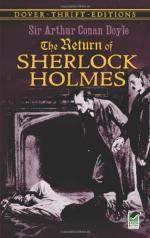“Neither do I,” said the morose landlord.
“The matter is very important. I would offer you a sovereign for the use of a bicycle.”
The landlord pricked up his ears.
“Where do you want to go?”
“To Holdernesse Hall.”
“Pals of the Dook, I suppose?” said the landlord, surveying our mud-stained garments with ironical eyes.
Holmes laughed good-naturedly.
“He’ll be glad to see us, anyhow.”
“Why?”
“Because we bring him news of his lost son.”
The landlord gave a very visible start.
“What, you’re on his track?”
“He has been heard of in Liverpool. They expect to get him every hour.”
Again a swift change passed over the heavy, unshaven face. His manner was suddenly genial.
“I’ve less reason to wish the Dook well than most men,” said he, “for I was head coachman once, and cruel bad he treated me. It was him that sacked me without a character on the word of a lying corn-chandler. But I’m glad to hear that the young lord was heard of in Liverpool, and I’ll help you to take the news to the Hall.”
“Thank you,” said Holmes. “Well have some food first. Then you can bring round the bicycle.”
“I haven’t got a bicycle.”
Holmes held up a sovereign.
“I tell you, man, that I haven’t got one. I’ll let you have two horses as far as the Hall.”
“Well, well,” said Holmes, “well talk about it when we’ve had something to eat.”
When we were left alone in the stone-flagged kitchen, it was astonishing how rapidly that sprained ankle recovered. It was nearly nightfall, and we had eaten nothing since early morning, so that we spent some time over our meal. Holmes was lost in thought, and once or twice he walked over to the window and stared earnestly out. It opened on to a squalid courtyard. In the far corner was a smithy, where a grimy lad was at work. On the other side were the stables. Holmes had sat down again after one of these excursions, when he suddenly sprang out of his chair with a loud exclamation.
“By heaven, Watson, I believe that I’ve got it!” he cried. “Yes, yes, it must be so. Watson, do you remember seeing any cow-tracks to-day?”
“Yes, several.”
“Were?”
“Well, everywhere. They were at the morass, and again on the path, and again near where poor Heidegger met his death.”
“Exactly. Well, now, Watson, how many cows did you see on the moor?”
“I don’t remember seeing any.”
“Strange, Watson, that we should see tracks all along our line, but never a cow on the whole moor. Very strange, Watson, eh?”
“Yes, it is strange.”
“Now, Watson, make an effort, throw your mind back. Can you see those tracks upon the path?”
“Yes, I can.”
“Can you recall that the tracks were sometimes like that, Watson,”—he arranged a number of bread-crumbs in this fashion—: : : : :—“and sometimes like this”—: . : . : . : .—“and occasionally like this”—. : . : . : . “Can you remember that?”




